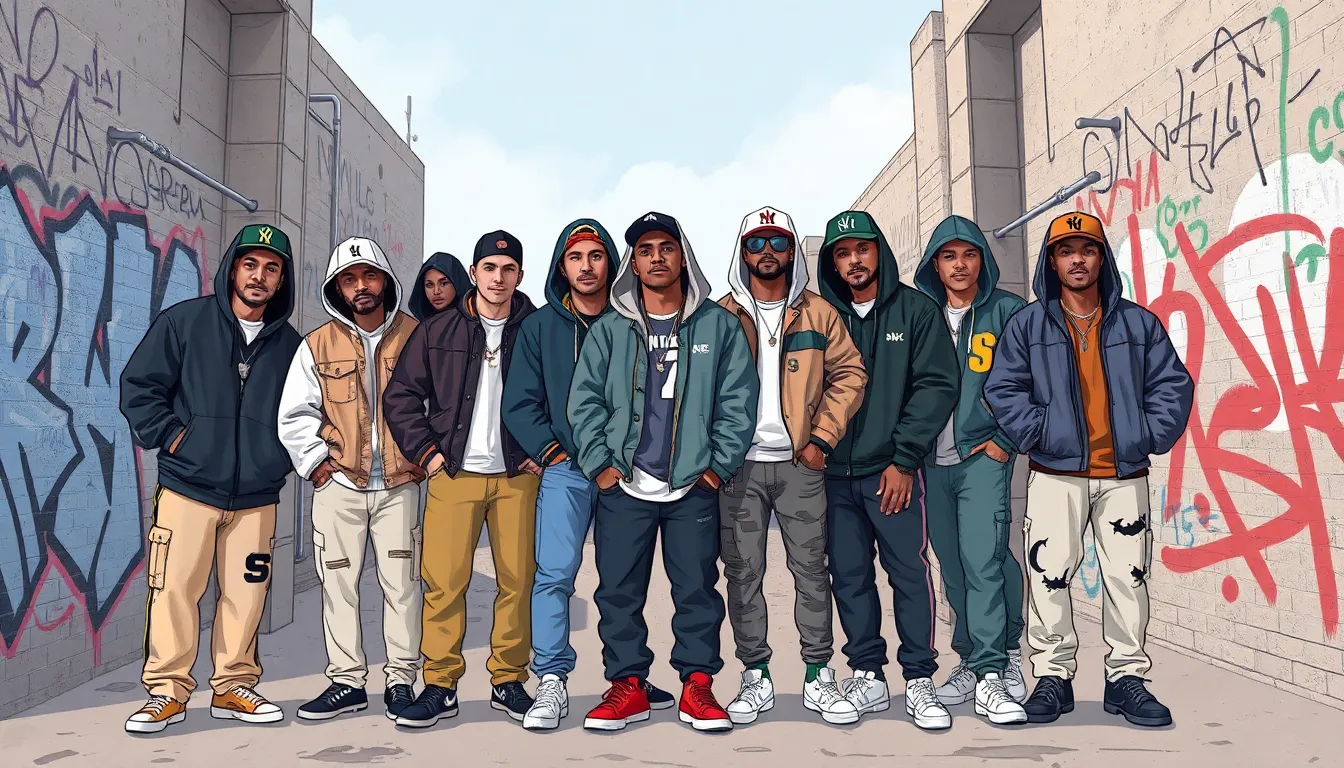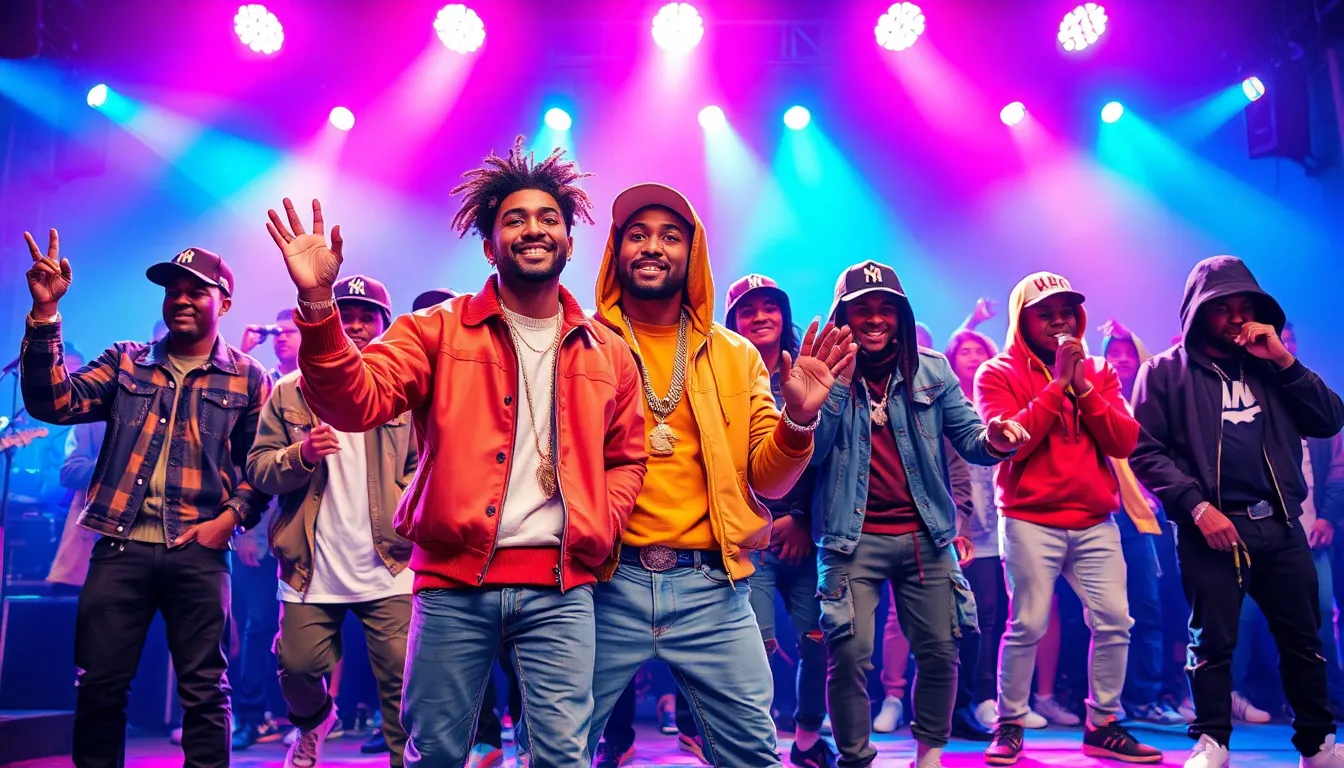Hip-hop groups have been shaking up the music scene for decades, blending beats and rhymes in ways that make you want to dance, rap along, or at least nod your head in appreciation. From the pioneers who laid the groundwork to the modern collectives redefining the genre, these dynamic ensembles bring a unique flair that solo artists just can’t match.
Imagine a stage filled with energy, charisma, and the kind of camaraderie that makes you wish you were part of the crew. Whether they’re spitting bars about life in the city or dropping tracks that make you laugh, hip-hop groups offer a rich tapestry of sound and style that keeps fans coming back for more. Buckle up as we dive into the world of hip-hop collectives that have made history and continue to shape the future of music.
Table of Contents
ToggleOverview of Hip-Hop Groups
Hip-hop groups embody a unique synergy that amplifies their creative output. Collaborations between artists within these collectives often lead to innovative sounds and memorable lyrics. Groups like the Wu-Tang Clan, known for their individual members’ distinct styles, paved the way for future collectives by blending varying influences.
Collectives also offer a platform for multiple voices, enabling them to tackle diverse themes in their music. The Fugees, for instance, brought together elements of soul, reggae, and rap to create impactful tracks. This mixture of genres showcases the versatility that groups bring to the hip-hop landscape.
Notably, the evolution of these groups reflects broader cultural shifts. In the early 1980s, groups such as Run-D.M.C. defined the genre’s commercial potential. Later, N.W.A. made waves with their raw storytelling and socio-political commentary, attracting attention to crucial social issues.
Throughout the 1990s and 2000s, influential ensembles like OutKast and A Tribe Called Quest expanded hip-hop’s reach by experiments with different musical styles. Current groups, such as Brockhampton, exemplify a fresh perspective on collaboration by incorporating various influences across the genre.
The impact of hip-hop groups on the music industry remains profound. They not only shape trends but also set the stage for future artists, fostering a sense of community that enriches the genre as a whole. Each collective contributes to the ever-evolving tapestry of hip-hop, ensuring its relevance across generations.
Evolution of Hip-Hop Groups

Hip-hop groups have undergone significant transformations, reflecting changes in culture and music. Their evolution illustrates how they adapt and influence broader trends.
The Golden Age of Hip-Hop
The Golden Age of Hip-Hop, spanning the late 1980s to early 1990s, marked a prolific period for group formations. Pioneers like Run-D.M.C. combined rock elements with rap, setting the stage for crossover success. N.W.A. introduced raw, real-life storytelling that resonated with marginalized communities. Groups such as A Tribe Called Quest and De La Soul explored socially conscious themes, pushing creative boundaries. This era established a template for collaboration and innovation, laying the groundwork for future collectives.
Modern Influences on Group Dynamics
Today’s hip-hop groups navigate a complex landscape influenced by social media and digital platforms. Brockhampton thrives on diverse members and fluid collaboration, reshaping traditional dynamics. Collectives often blend genres like R&B and pop, attracting varied audiences. Their use of platforms like YouTube and TikTok amplifies reach, enabling rapid fan engagement. Collaborative projects now reflect a mixture of influences, showcasing the versatility in modern hip-hop. These shifts demonstrate a commitment to evolving artistry while staying connected to the roots of hip-hop culture.
Iconic Hip-Hop Groups
Hip-hop groups have left an indelible mark on music through their unique sounds and powerful lyrics. The influence of these collectives spans decades, shaping the genre and inspiring future artists.
Wu-Tang Clan
Wu-Tang Clan emerged in the early 1990s, revolutionizing hip-hop with their gritty style and raw storytelling. Comprised of nine members, including RZA, GZA, and Method Man, they introduced a distinct fusion of East Coast hip-hop and martial arts culture. Their debut album, Enter the Wu-Tang (36 Chambers), set new benchmarks for lyricism and production quality. Iconic tracks like “C.R.E.A.M.” and “Protect Ya Neck” showcased their ability to blend vivid narratives with hard-hitting beats. Wu-Tang’s impact extends beyond music; their brand, including merchandise and films, solidified their status in pop culture.
A Tribe Called Quest
A Tribe Called Quest defined alternative hip-hop in the late 1980s and early 1990s with their innovative sound. Members Q-Tip and Phife Dawg combined jazz influences with clever wordplay and introspective lyrics. Their album The Low End Theory is often hailed as one of the greatest of all time. Songs like “Can I Kick It?” and “Scenario” emphasized the importance of collaboration and creativity. Through their artistic vision, they addressed themes of social consciousness and cultural identity, making them influential figures in hip-hop history. A Tribe Called Quest continues to inspire new generations with their timeless messages and musical innovation.
Impact of Hip-Hop Groups on Culture
Hip-hop groups significantly shape culture through social commentary and lifestyle influence. Their music often resonates with audiences, reflecting societal issues and personal experiences.
Social and Political Commentary
Hip-hop groups frequently address social injustices through their lyrics, becoming pivotal voices in movements. N.W.A. exemplified this by tackling police brutality in their track “F*** tha Police,” which sparked discussions nationwide. Likewise, Public Enemy used their platform to critique systemic racism and encourage activism, influencing generations. Contemporary collectives, such as Run the Jewels, continue this tradition, merging strong political messages with engaging beats. These powerful themes resonate widely, connecting listeners to urgent societal issues and inspiring action.
Influence on Fashion and Lifestyle
Fashion trends often stem from hip-hop culture, with groups leading the way. Artists like Run-D.M.C. popularized athletic wear, merging music and style that changed street fashion. OutKast introduced vibrant patterns and bold designs, inspiring a generation to embrace individuality. Likewise, Wu-Tang Clan emphasized the importance of unique branding, creating merchandise that reflects their identity. Lifestyle changes accompany these innovations, as fans adopt trends showcased by their favorite artists. This interplay between hip-hop and culture drives fashion forward, creating a rich tapestry of influence that transcends music.
Hip-hop groups have undeniably transformed the music landscape and culture at large. Their collaborative spirit fosters creativity and innovation that resonates deeply with audiences. As these collectives continue to evolve they remain vital in addressing social issues and shaping cultural movements.
The legacy of iconic groups serves as a foundation for new ensembles that push boundaries and redefine what hip-hop can be. With their unique blend of beats and powerful messages hip-hop groups will undoubtedly continue to influence future generations. The genre thrives on this sense of community and shared experience that only collectives can provide.



